Charles E W Bean, Diaries, AWM38 3DRL 606/38B/1 - Notebook - Part 2
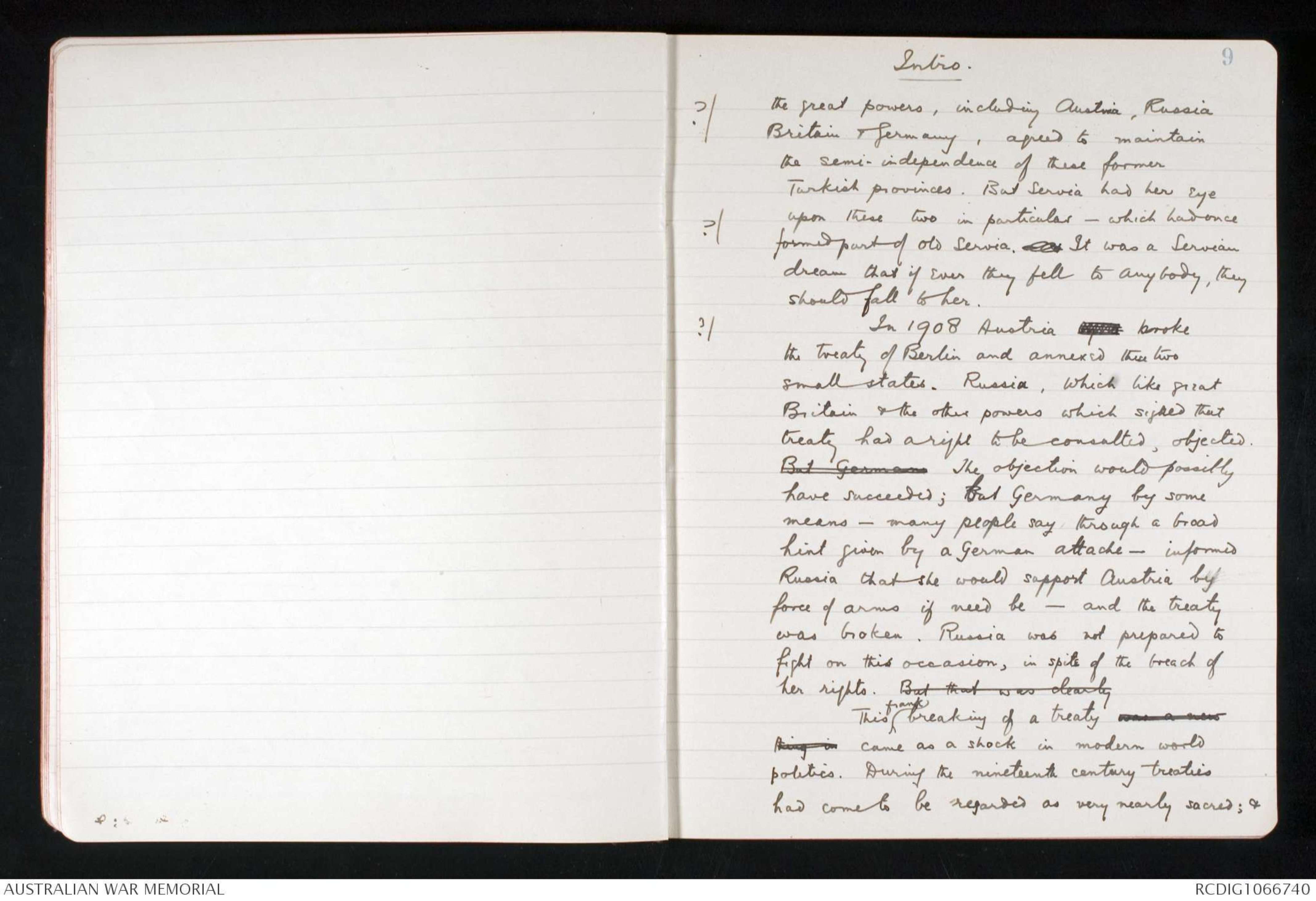
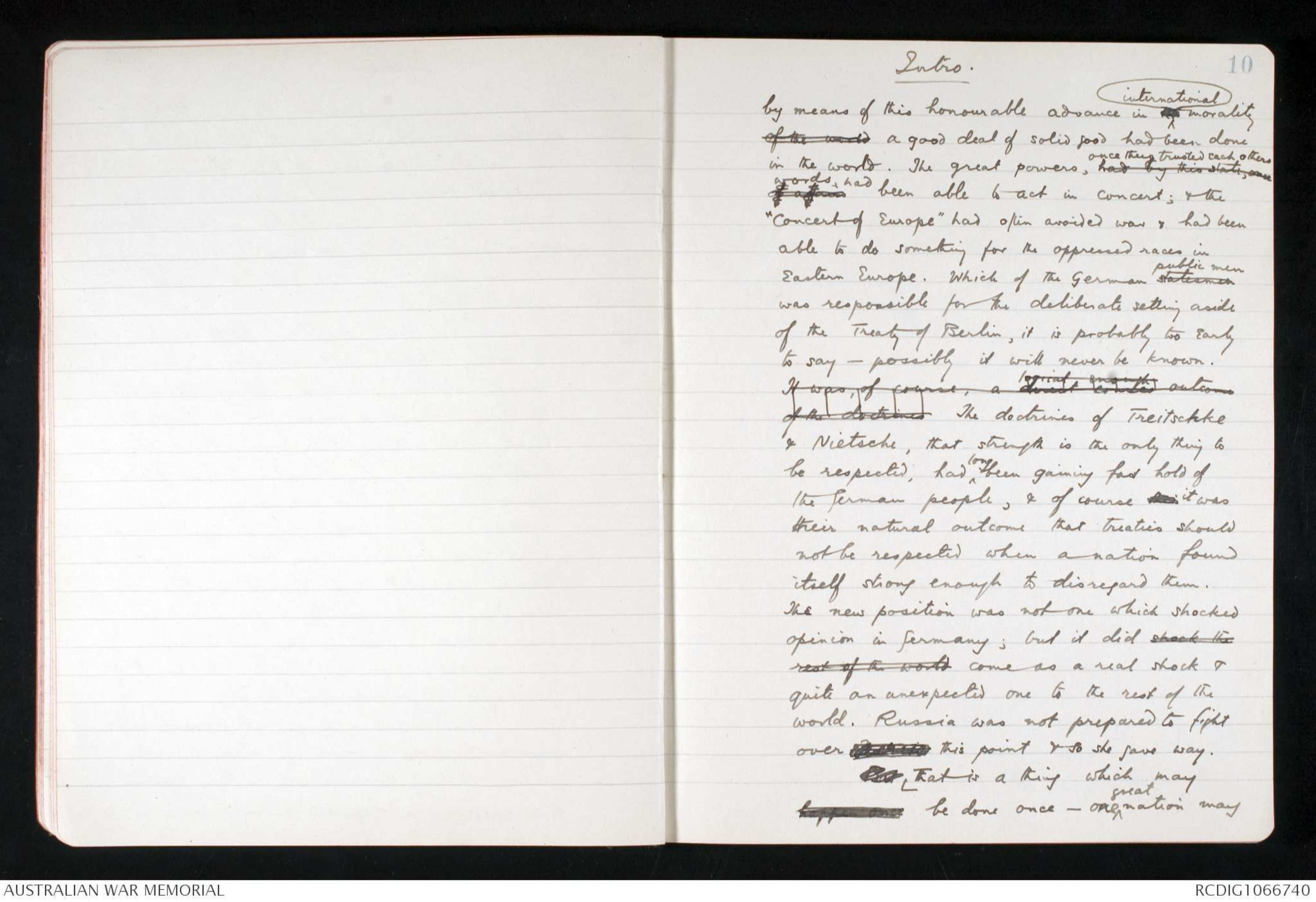
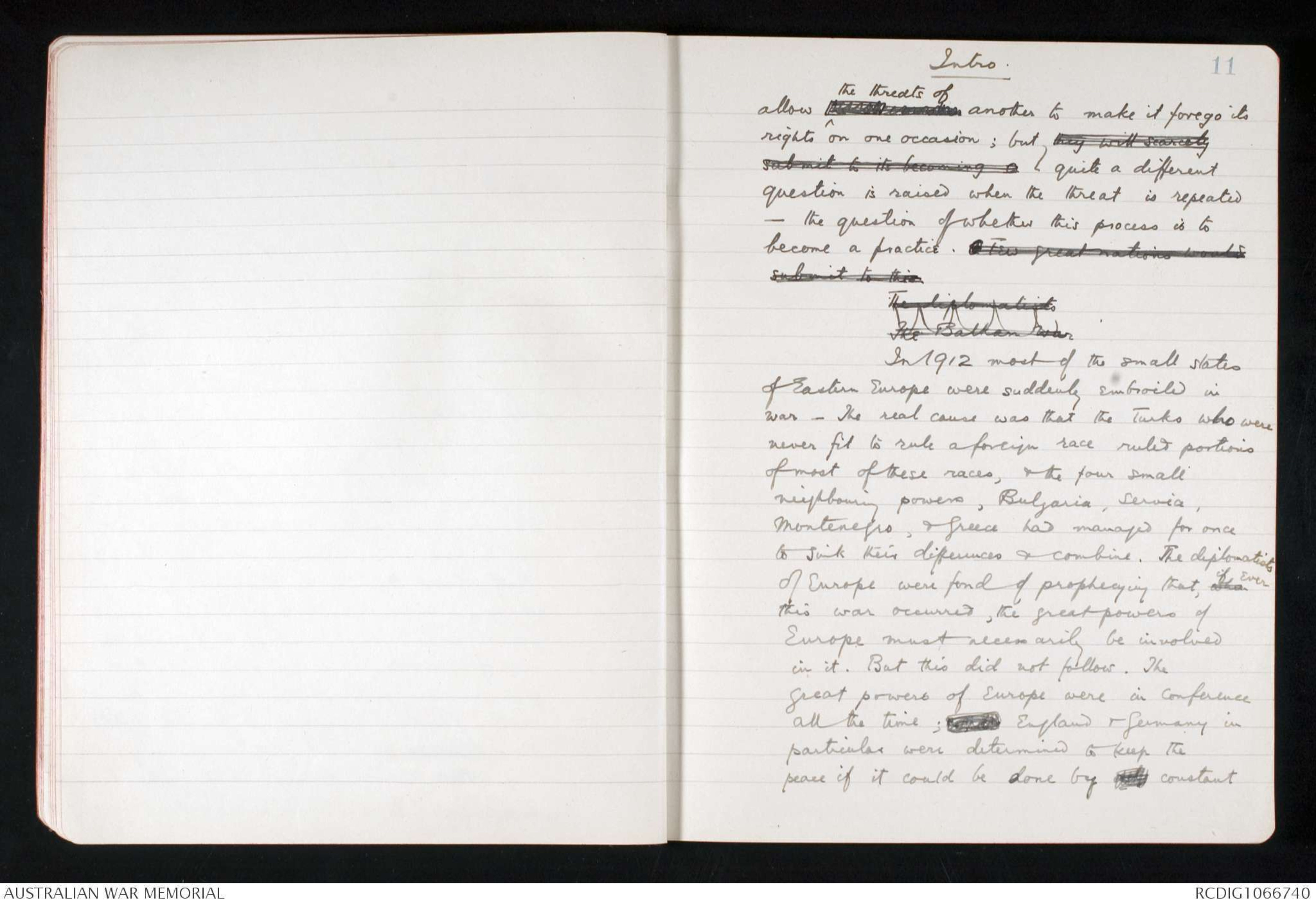
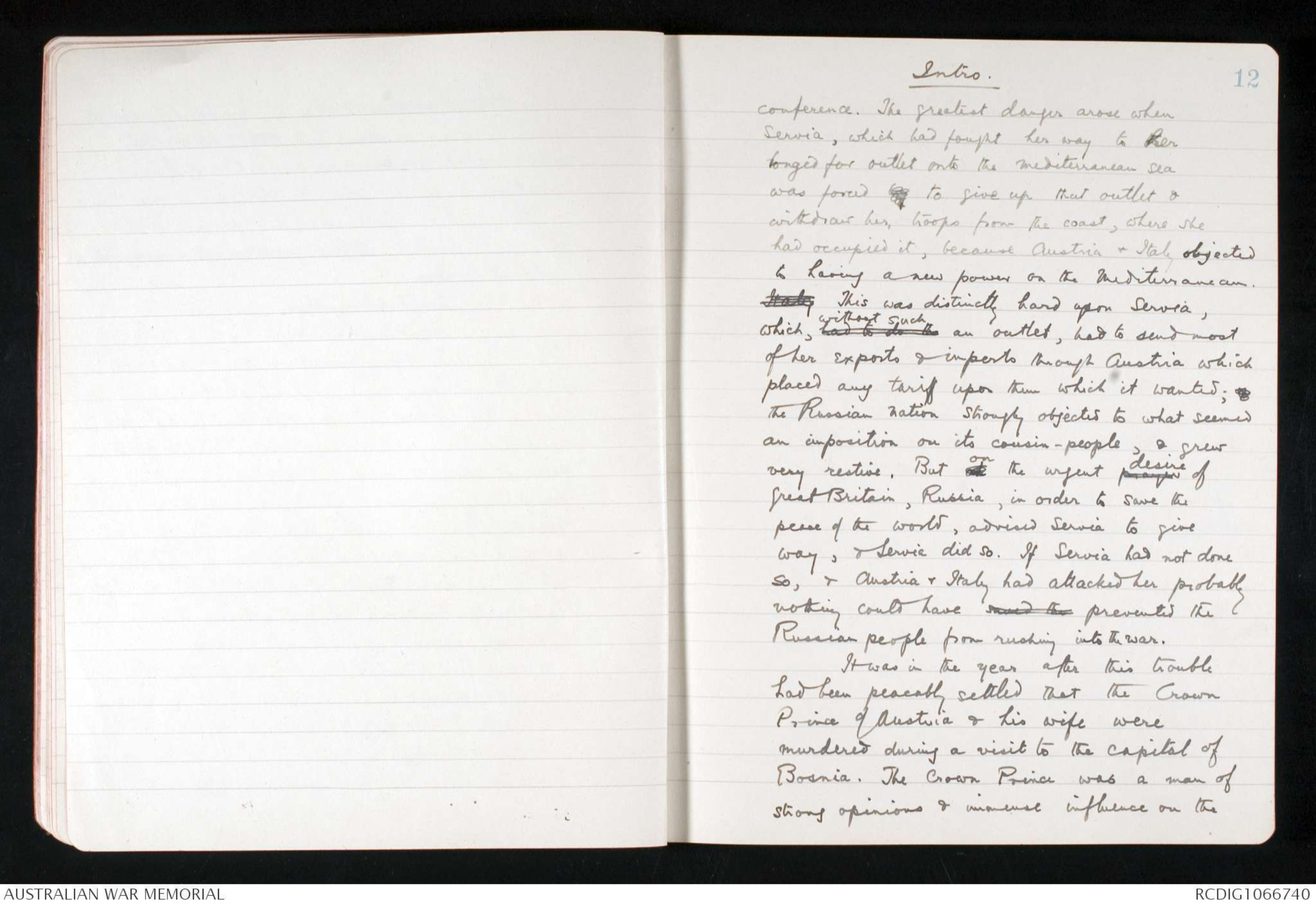
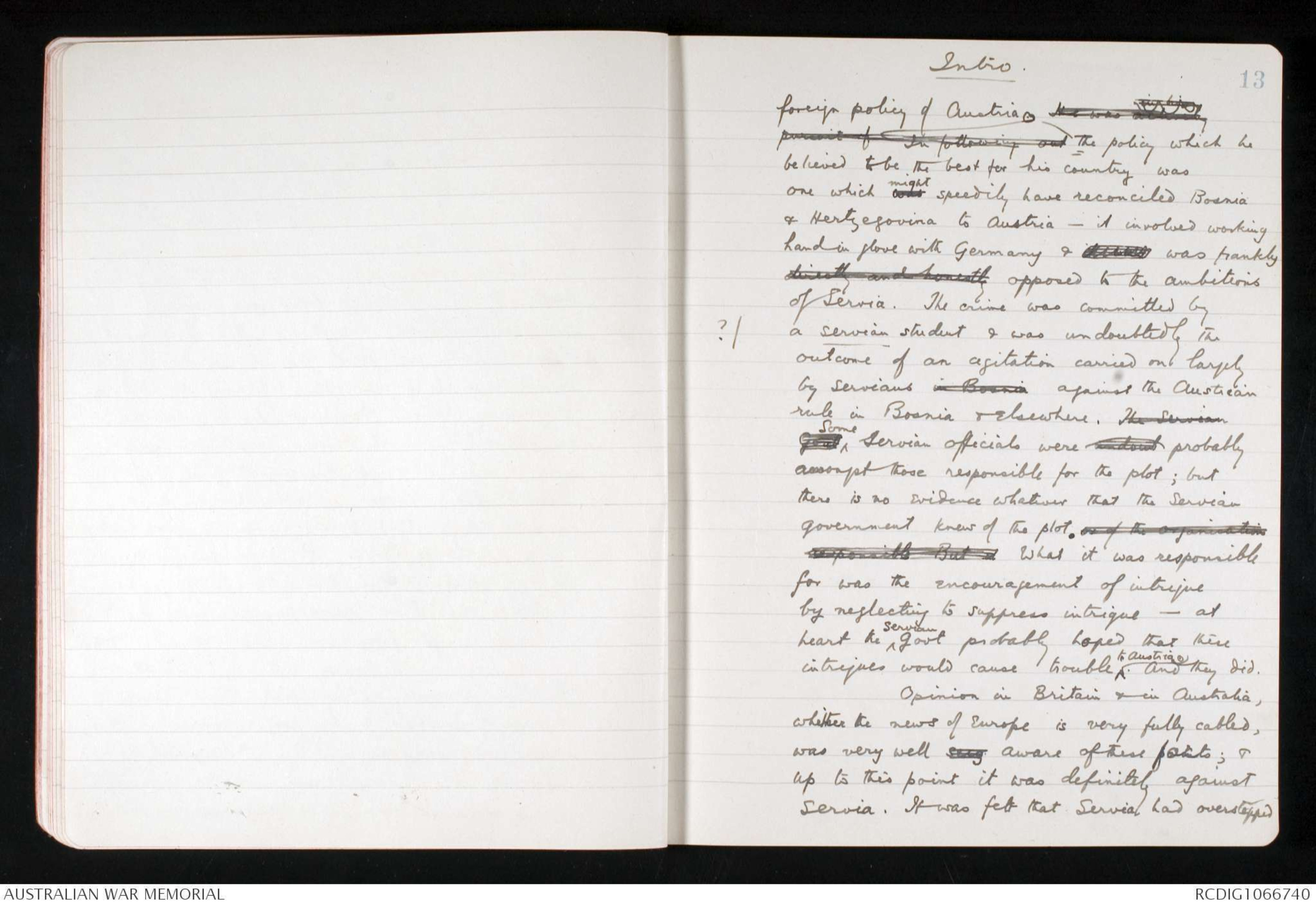
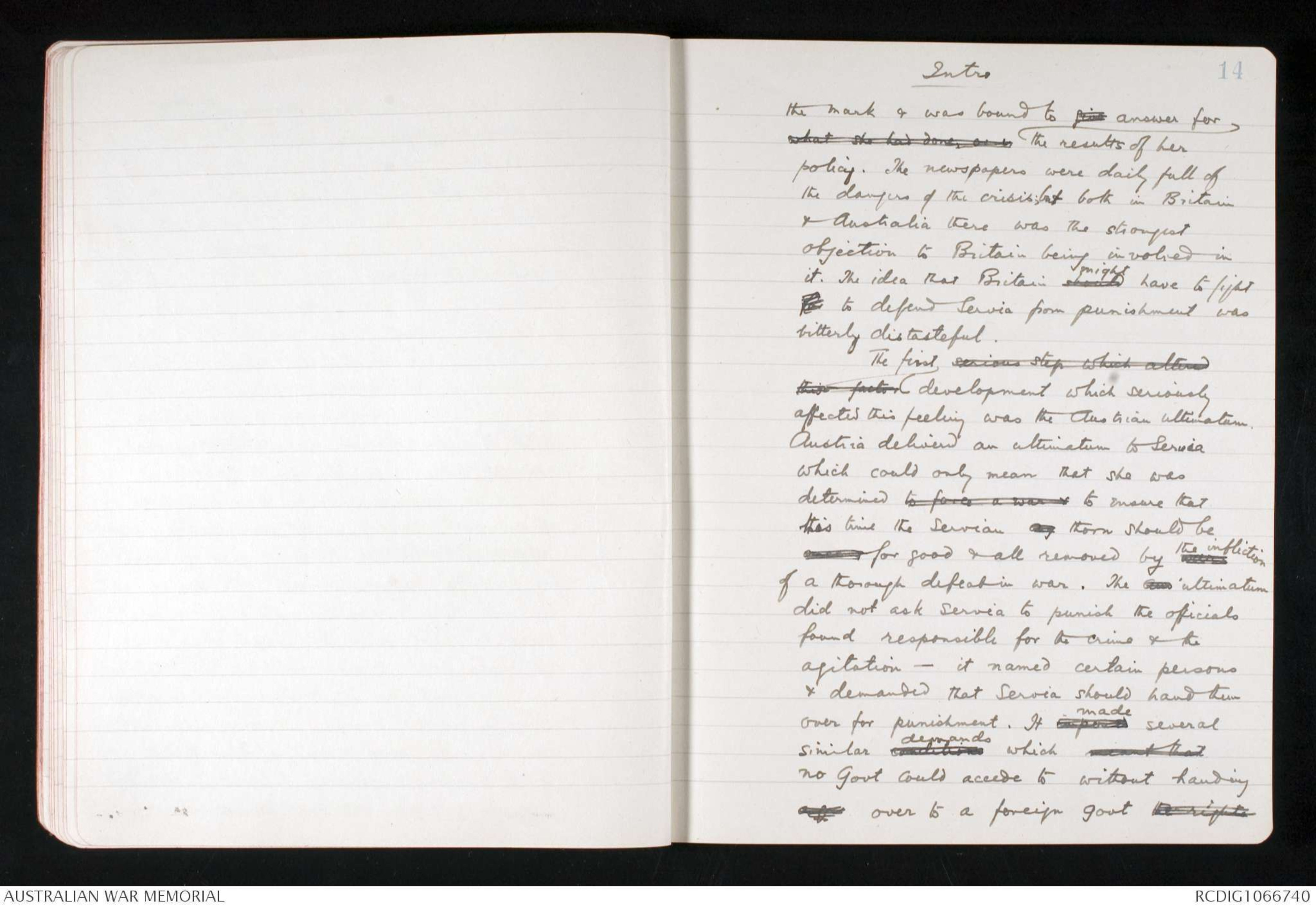
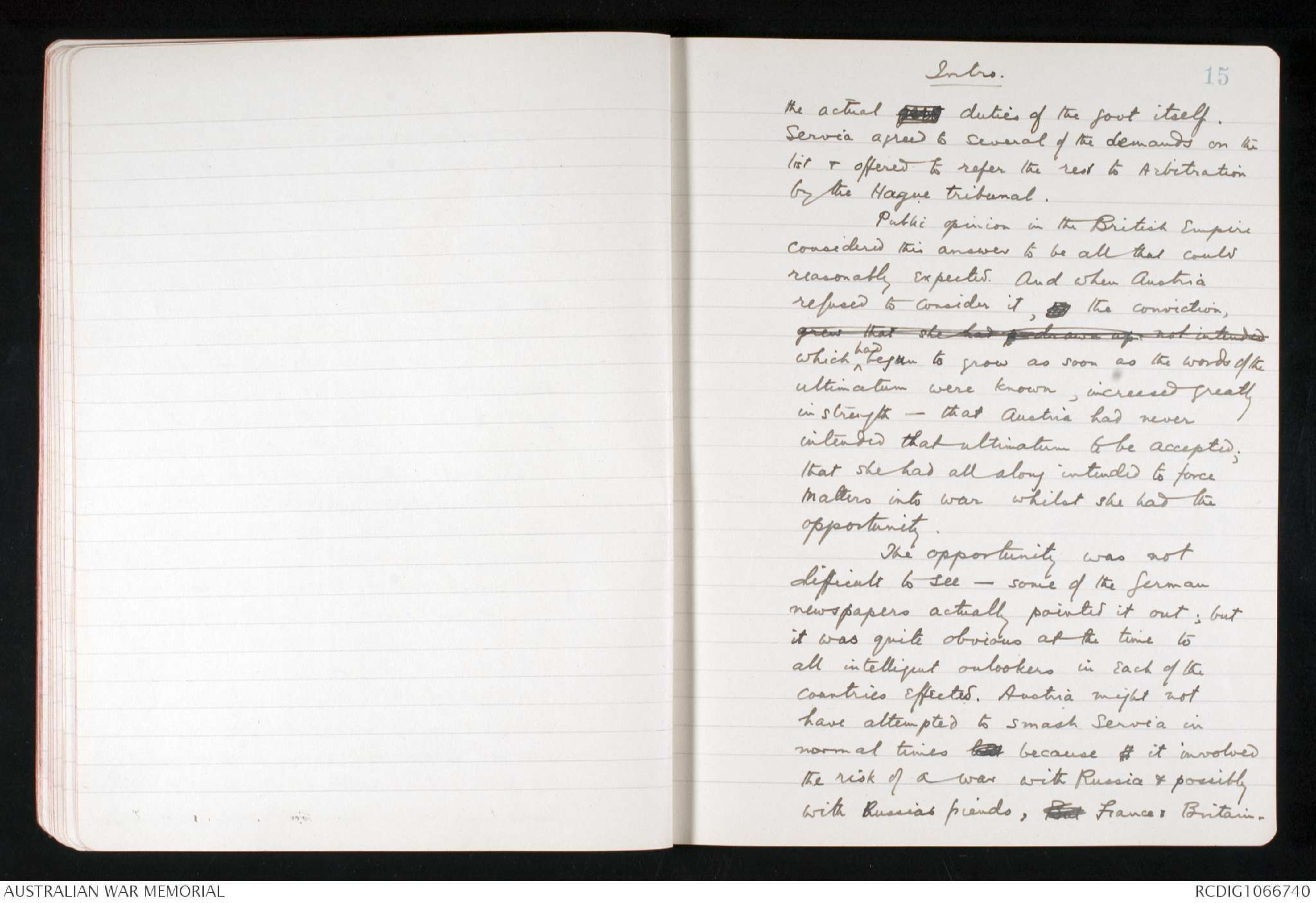
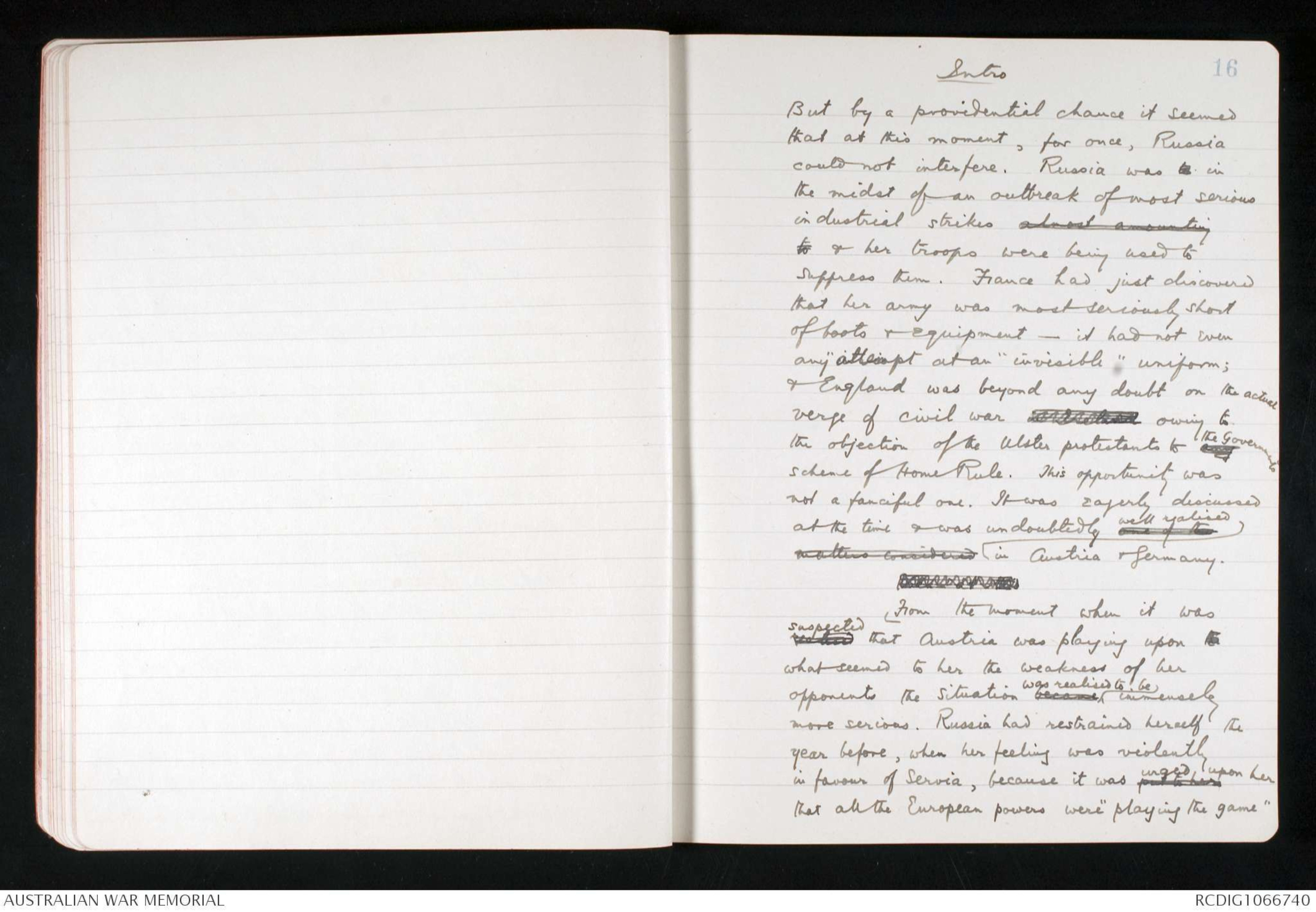
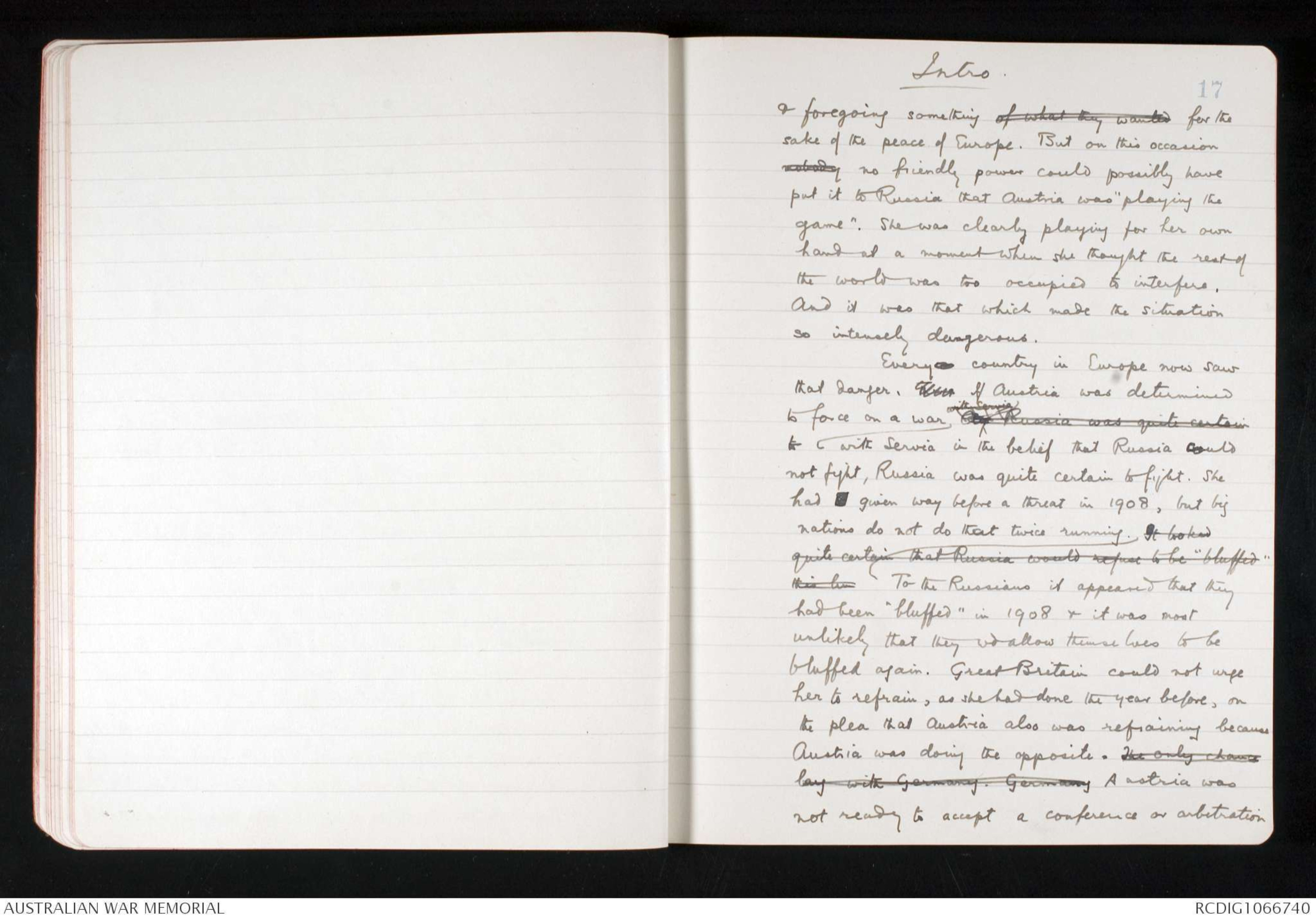
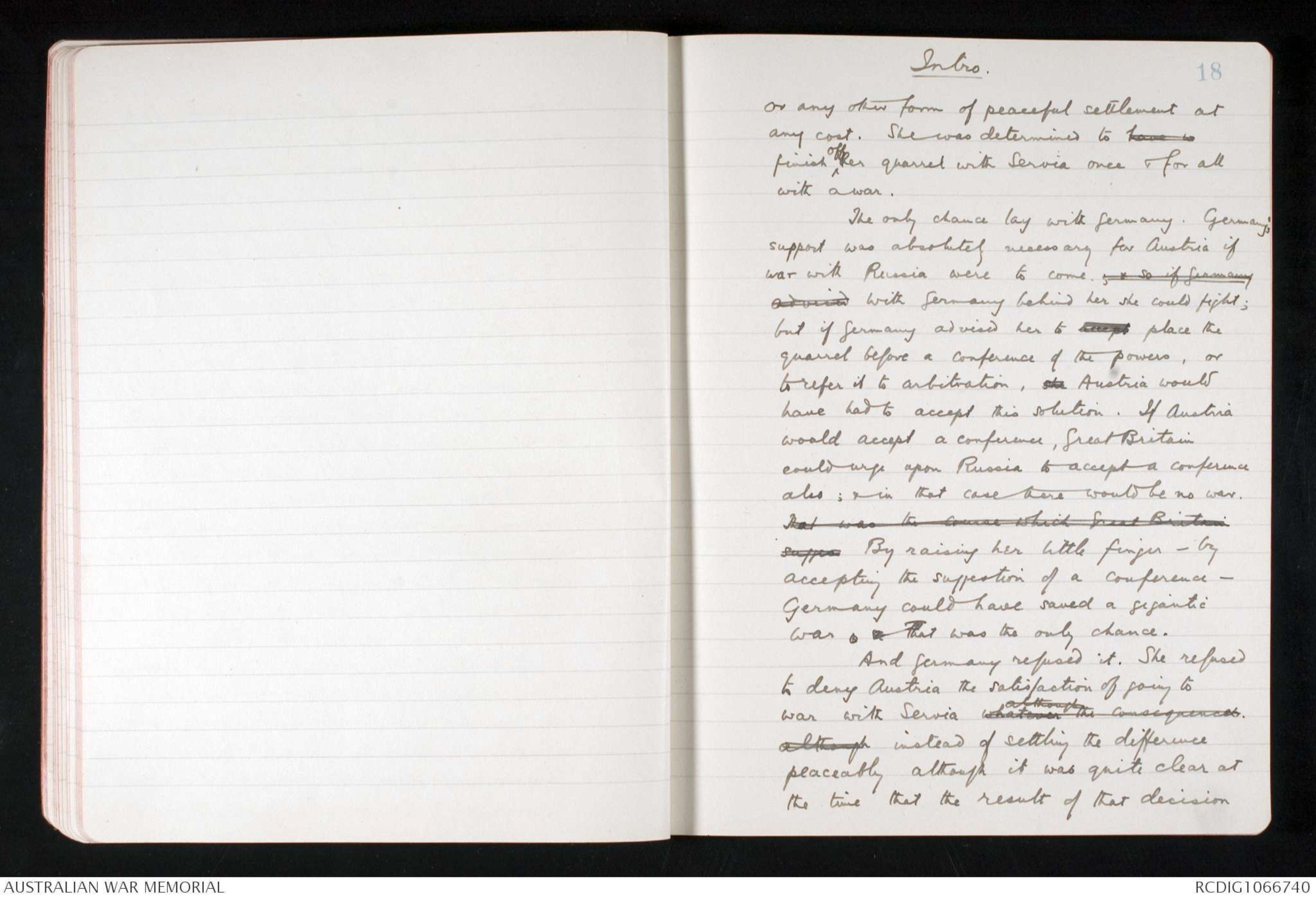
9
Intro.
[*?/*] the great powers, including Austria, Russia
Britain & Germany, agreed to maintain
the semi-independence of these former
Turkish provinces. But Servia had her eye
upon these two in particular – which had once
[*?/*] formed part of old Servia. xxx It was a Servian
dream that if ever they fell to anybody, they
should fall to her.
[*?/*] In 1908 Austria xxxx broke
the treaty of Berlin and annexed these two
small states. Russia, which like great
Britain & the other powers which signed that
treaty had a right to be consulted, objected.But Germans The objection would possibly
have succeeded; but Germany by some
means - many people say through a broad
hint given by a German attache - informed
Russia that she would support Austria by
force of arms if need be - and the treaty
was broken. Russia was not prepared to
fight on this occasion, in spite of the breach of
her rights. But that was clearly
This ^frank breaking of a treaty over a newthing in came as a shock in modern world
politics. During the nineteenth century treaties
had come to be regarded as very nearly sacred; &
10
Intro.
by means of this honourable advance in the ^international moralityof the world a good deal of solid good had been done
in the world. The great powers, had by this state, once once they trusted each othersof affairs words, had been able to act in concert; & the
"Concert of Europe" had often avoided war & had been
able to do something for the oppressed races in
Eastern Europe. Which of the German statesmen public men
was responsible for the deliberate setting aside
of the Treaty of Berlin, it is probably too early
to say - possibly it will never be known.It was, of course, a logical enough direct counter outcomeof the doctrines The doctrines of Treitschke
& Nietsche, that strength is the only thing to
be respected, had ^long been gaining fast hold of
the German people, & of course then it was
their natural outcome that treaties should
not be respected when a nation found
itself strong enough to disregard them.
The new position was not one which shocked
opinion in Germany; but it did shock therest of the world come as a real shock &
quite an unexpected one to the rest of the
world. Russia was not prepared to fight
over Servia this point & so she gave way.But That is a thing which mayhappen once be done once - one ^great nation may
11
Intro.
allow ^the threats of xxxxxxx another to make it forego its
rights on one occasion; but↓ they will scarcelysubmit to its becoming a quite a different
question is raised when the threat is repeated
- the question of whether this process is to
become a practice. x Two great nations wouldsubmit to theirThe diplomastistsThe Balkan War
In 1912 most of the small states
of Eastern Europe were suddenly embroiled in
war - The real cause was that the Turks who were
never fit to rule a foreign race ruled portions
of most of these races, & the four small
neighbouring powers, Bulgaria, Servia,
Montenegro, & Greece had managed for once
to sink their differences & combine. The diplomatists
of Europe were fond of prophecying that, if ever when
this war occurred, the great powers of
Europe must necessarily be involved
in it. But this did not follow. The
great powers of Europe were in Conference
all the time; xxxx England & Germany in
particular were determined to keep the
peace if it could be done by xxx constant
12
Intro.
conference. The greatest danger arose when
Servia, which had fought her way to her
longed for outlet onto the mediterranean sea
was forced by to give up that outlet &
withdraw her, troops from the coast, where she
had occupied it, because Austria & Italy objected
to having a new power on the Mediterranean.Italy This was distinctly hard upon Servia,
which, without such had to do the an outlet, had to send most
of her exports & imports through Austria which
placed any tariff upon them which it wanted; xx
the Russian nation strongly objected to what seemed
an imposition on its cousin - people, & grew
very restive. But at on the urgent prayer desire of
Great Britain, Russia, in order to save the
peace of the world, advised Servia to give
way, & Servia did so. If Servia had not done
so, & Austria & Italy had attacked her probably
nothing could have saved the prevented the
Russian people from rushing into the war.
It was in the years after this trouble
had been peacably settled that the Crown
Prince of Austria & his wife were
murdered during a visit to the capital of
Bosnia. The Crown Prince was a man of
strong opinions & immense influence on the
13
Intro.
foreign policy of Austria. He was acting in a xxxpursuit of In following out The policy which he
believed to be the best for his country was
one which was might speedily have reconciled Bosnia
& Hertzegovina to Austria - it involved working
hand in glove with Germany & xxxxx was franklydirectly & honestly opposed to the ambitions
of Servia. The crime was committed by
[*?/*] a servian student & was undoubtedly the
outcome of an agitation carried on largely
by Servians in Bosnia against the Austrian
rule in Bosnia & elsewhere. The ServianGovt ^Some Servian officials were undoubt probably
amongst those responsible for the plot; but
there is no evidence whatever that the Servian
government knew of the plot. or of the organisationresponsible. But it What it was responsible
for was the encouragement of intrigue
by neglecting to suppress intrigue - at
heart the ^Servian govt probably hoped that these
intrigues would cause trouble ^to Austria. And they did.
Opinion in Britain & in Australia,
whither the news of Europe is very fully cabled,
was very well seig aware of these facts; &
up to this point it was definitely against
Servia. It was felt that Servia had overstepped
14
Intro
the mark & was bound to give answer forwhat she had done or the results of her
policy. The newspapers were daily full of
the dangers of the crisis; but both in Britain
& Australia there was the strongest
objection to Britain being involved in
it. The idea that Britain should might have to fightfor to defend Servia from punishment was
bitterly distasteful.
The first serious step which alteredthis factor development which seriously
affected this feeling was the Austrian ultimatum.
Austria delivered an ultimatum to Servia
which could only mean that she was
determined to force a war & to ensure that
this time the Servian ag thorn should beonce & for good & all removed by war the infliction
of a thorough defeat in war. The aus ultimatum
did not ask Servia to punish the officials
found responsible for to crime & the
agitation - it named certain persons
& demanded that Servia should hand them
over for punishment. It imposed made several
similar conditions demands which meant that
no Govt could accede to without handingxxx over to a foreign govt the rights
15
Intro.
the actual xxxx duties of the govt itself.
Servia agreed to several of the demands on the
list & offered to refer the rest to Arbitration
by the Hague tribunal.
Public opinion in the British Empire
considered this answer to be all that could
reasonably expected. And when Austria
refused to consider it, xx the conviction,grew that she had xx drawn up not intended
which ^had begun to grow as soon as the words of the
ultimatum were known, increased greatly
in strength - that Austria had never
intended that ultimatum to be accepted;
that she had all along intended to force
matters into war whilst she had the
opportunity.
The opportunity was not
difficult to see - some of the German
newspapers actually pointed it out; but
it was quite obvious at the time to
all intelligent onlookers in each of the
countries effected. Austria might not
have attempted to smash Servia in
normal times but because xx it involved
the risk of a war with Russia & possibly
with Russias friends, But France & Britain.
16
Intro
But by a providential chance it seemed
that at this moment, for once, Russia
could not interfere. Russia was to in
the midst of an outbreak of most serious
industrial strikes almost amountingto & her troops were being used to
suppress them. France had just discovered
that her army was most seriously short
of boots & equipment - it had not even
any "attempt at an "invisible" uniform;
& England was beyond any doubt on the actual
verge of civil war xxxxxxx owing to
the objection of the Ulster protestants to xxxx the Governments
scheme of Home Rule. This opportunity was
not a fanciful one. It was eagerly discussed
at the time & was undoubtedly one of the well realisedmatters considered in Austria & Germany.xxxxxxxxxxx
From the moment when it wasrealised suspected that Austria was playing upon th
what seemed to her the weakness of her
opponents the situation became ^was realised to be immensely
more serious. Russia had restrained herself the
year before, when her feeling was violently
in favour of Servia, because it was put to her urged upon her
that all the European powers were "playing the game"
17
Intro.
& foregoing something of what they wanted for the
sake of the peace of Europe. But on this occasionnobody no friendly power could possibly have
put it to Russia that Austria was "playing the
game". She was clearly playing for her own
hand at a moment when she thought the rest of
the world was too occupied to interfere.
And it was that which made the situation
so intensely dangerous.
Every xx country in Europe now saw
that danger. Even If Austria was determined
to force on a war ^with Servia As Russia was quite certainto with Servia in the belief that Russia could
not fight, Russia was quite certain to fight. She
had xx given way before a threat in 1908, but big
nations do not do that twice running, It lookedquite certain that Russia would refuse to be "bluffed"this tim To the Russians it appeared that they
had been "bluffed" in 1908 & it was most
unlikely that they wd allow themselves to be
bluffed again. Great Britain could not urge
her to refrain, as she had done the year before, on
the plea that Austria also was refraining because
Austria was doing the opposite. The only chancelay with Germany. Germany Austria was
not ready to accept a conference or arbitration
- 18
Intro.
or any other form of peaceful settlement at
any cost. She was determined tohave no
finish ^off her quarrel with Servia once & for all
with a war.
The only chance lay with Germany. Germany's
support was absolutely necessary for Austria if
war with Russia were to come.; & so if Germanyadvisedwith Germany behind her she could fight;
but if Germany advised her toacceptplace the
quarrel before a conference of the powers, or
to refer it to arbitration,sheAustria would
have had to accept this solution. If Austria
would accept a conference, Great Britain
could urge upon Russia to accept a conference
also; & in that case there would be no war.That was the course which Great BritainsuggesBy raising her little finger - by
accepting the suggestion of a conference -
Germany could have saved a gigantic
warx&That was the only chance.
And Germany refused it. She refused
to deny Austria the satisfaction of going to
war with Serviaalthoughwhatever the consequences.althoughinstead of settling the difference
peaceably although it was quite clear at
the time that the result of that decision
 Deb Parkinson
Deb ParkinsonThis transcription item is now locked to you for editing. To release the lock either Save your changes or Cancel.
This lock will be automatically released after 60 minutes of inactivity.